|
 |
|
|
|
|
| 1. Preface |
|
Mr. Masaaki Sakuma is a friend of mine since I was a member in the AA-net
circle in Urayasu City around 10 years ago.
This is his couple, Masaaki and Fumiko-san.
|
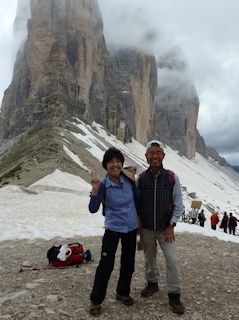 |
| June 2014, Dolomiti, Italy |
Mr. Sakuma, I call him Masa from now, is 72 years old, 4 years younger
than me. He lives in the same town with me, Urayasu City, Chiba Prefecture,
enjoying hiking both domestic and overseas with his wife Fumiko-san, besides
contributing to our community as a member of arbitration board.
When I informed him of my recent trip to my hometown in Nanki-Kumano District
which is famous for Kumano-Kodo or Kumano Ancient Pilgrimage Routes, he
replied and referred to his pilgrimage to Santiago de Compostela, Spain,
this June.
By my request, he came over and talked about his pilgrimage this time with
a lot of documents.
|
|
This is my first time to listen to a long pilgrimage by one's own plan,
and what's more, overseas.
I was impressed so deeply with the details of his talk and documents that
I decided to ruminate his pilgrimage to Santiago de Compostela and then
finally to the view point of the Atlantic Ocean (Camino de Santiago of
his own), with the help of his documents and photos. |
|
| Now the outline of Masa's Camino de Santiago 2016.
The Camino de Santiago is the pilgrimage to the shrine of the apostle St.
James the Great in the Cathedral of Santiago de Compostela in Galicia,
north-western Spain.
There are now the following 20 routes of Camino de Santiago according to
caminoway.com.
| French Way |
Portuguese Coastal |
| Portuguese Way |
Northern Way |
| English Way |
Finisterre Way |
| Lighthouse Way |
Fishermen's Trail |
| Camino de Invierno |
Le Puy Way |
| Original Way |
Via de la Plata |
| Arles Way |
Camino Catalan |
| Geneva Way |
Cluny Way |
| Paris & Tours Way |
Vezelay Way |
| Mont Saint Michel Way |
Coach Trips |
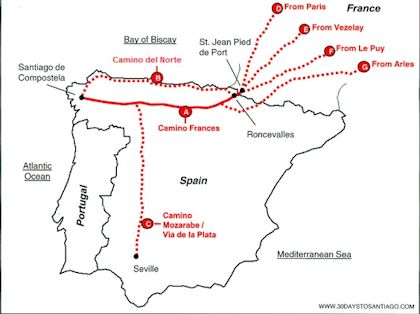
Masa walked along the French Way (Camino Frances), the most popular among
them to visit the Cathedral of Santiago de Compostela, and then extended
his way to Muxia along the Finisterre Way (Camino Fisterra) to have a view
of the Atlantic Ocean. Total distance was 904.5 km spending 30 days.
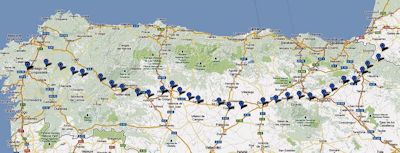 |
| French Way |
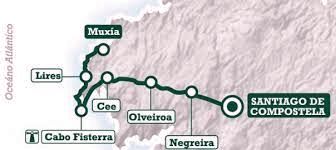 |
| Finisterre Way |
In an attempt to start the pilgrimage on May 25 from Saint-Jean-Pied-de-Port,
France, he left Narita Airport by AF 275 at 11:00 on Monday, May 23, and
landed at Paris at 16:15 local time the same day.
He stayed at a hotel in Montparnasse that night.
The next morning he headed for the starting point Saint-Jean-Pied-de-Port
by TGV train, and arrived there late at night. While in the train, he was
about to have a hard time because of the delay by some fatal accident.
He had a kindness from a gentleman and a lady. They explained what happened
then and how to spend the idle time in slow and steady English to let him
understand. So, Masa felt at ease thanks to them and got to the destination
at 17:12.
He stayed at an albergue with dinner and breakfast there.
- - - - -
The following table shows Masa's pilgrimage route to Santiago de Compostela,
and then to Muxia.
From the next chapter, I will pick up where and how he walked for 30 days
from his detailed diary, with what he encountered and what impressed him
on the way.
|
|
| date |
|
destination of the day |
|
distance |
1st, Wed.
May 25 |
|
From Saint-Jean-Pied-de-Port
To Roncesvalles |
|
25.0 km |
2nd, Thu.
May 26 |
|
To Larrasoana |
|
27.0 km |
3rd, Fri.
May 27 |
|
To Zariquiegui |
|
27.1 km |
4th, Sat.
May 28 |
|
To Villatuerta |
|
31.0 km |
5th, Sun.
May 29 |
|
To Torres del Rio |
|
32.8 km |
6th, Mon,
May 30 |
|
To Navarrete |
|
33.3 km |
7th, Tue,
May 31 |
|
To Santo Domingo de la Calzada |
|
38.4 km |
8th, Wed.
June 1 |
|
To Villafranca Montes de Oca |
|
34.8 km |
9th, Thu,
June 2 |
|
To Brugos |
|
39.7 km |
10th, Fri.
June 3 |
|
To Hontanas |
|
31.8 km |
11th, Sat.
June 4 |
|
To Fromista |
|
34.6 km |
12th, Sun.
June 5 |
|
To Calzadilla de la Cueza |
|
37.6 km |
13th, Mon.
June 6 |
|
To Bercianos del Real Camino |
|
30.8 km |
14th, Tue.
June 7 |
|
To Villarente |
|
32.8 km |
15th, Wed.
June 8 |
|
To Villadangos del Paramo |
|
34.2 km |
16th, Thu.
June 9 |
|
To Murias de Rechivaldo |
|
32.7 km |
17th, Fri.
June 10 |
|
To Riego de Ambros |
|
34.9 km |
18th, Sat.
June 11 |
|
To Villafranca del Bierzo |
|
36.6 km |
19th, Sun.
June 12 |
|
Hospital de la Condesa |
|
35.6 km |
20th, Mon.
June 13 |
|
To Samos |
|
24.5 km |
21th, Tue.
June 14 |
|
To Portomarin |
|
34.6 km |
22th, Wed.
June 15 |
|
To Mato-Casanova |
|
30.6 km |
23th, Thu.
June 16 |
|
To O Pedruzo |
|
42.1 km |
24th, Fri.
June 17 |
|
To Santiago de Compostela |
|
20.1 km |
|
|
|
|
782.7 km
(subtotal) |
|
|
|
|
|
25th, Sat.
June 18 |
|
Walking in
Santiago de Compostela |
|
|
26th, Sun.
June 19 |
|
To Negreira |
|
22.4 km |
27th, Mon.
June 20 |
|
To Olveiroa |
|
33.1 km |
28th, Tue.
June 21 |
|
To Cee |
|
18.3 km |
29th, Wed.
June 22 |
|
To Fisterra |
|
20.0 km |
30th, Thu.
June 23 |
|
To Muxia |
|
28.0 km |
|
|
|
|
904.5 km
(total) |
|
|
Before this pilgrimage, Masa had a careful preparation as follows.
|
|
| 1. |
Information collection -- read journals of experience and guidebooks |
| 2. |
Make a road map with an itinerary (30 days + 3 alternative days = 33 days
in total) |
| 3. |
Join the meetings of "Associacion de Amigos del Camino de Santiago
en Japon"
Get the guidebook of Camino de Santiago by the association and the book
"John Brierley's Camino de Santiago" |
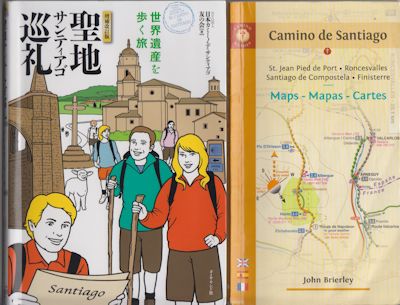 |
| 4. |
Prepare a budget |
| 5. |
Open a bank account for Euro |
| 6. |
Check of the equipment -- up to 10kg with the backpack |
| 7. |
Advance training, work-up of the new shoes |
| 8. |
Make transportation arrangements to and from the pilgrimage |
| 9. |
Make sure of the means of communication during the pilgrimage to Docomo |
- - - - -
Re: Albergue
Masa stayed in albergues through his Camino de Santiago for 30 days. Let
me explain what an albergue is.
"Albergue" is a Spanish word of "a lodging for pilgrims".
It consists of two types.
One is Pubrico, managed by a local government, a church, a monastery or
a covent.
Another is Privado, managed by a local group or privately.
|
|
| Reading : 9' 17" |
|
|
|
|
|
|
|
|
|
|